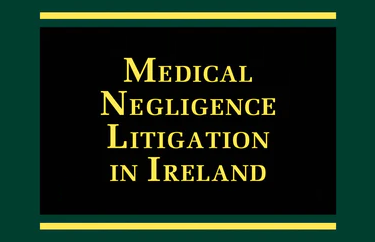Medical negligence, also known as medical malpractice, occurs when a healthcare professional fails to exercise an accepted standard of care towards a patient, resulting in injury or harm. In recent years, there has been increased awareness among patients in Ireland about medical negligence and their legal rights in such scenarios.
When medical negligence occurs, it can have devastating consequences for patients and their families. Physical trauma, long-term disability, loss of income, emotional distress and grief are common outcomes. In the worst cases, it can even lead to the untimely death of the patient. Patients are also more actively seeking legal recourse when they face the impact of medical negligence through experienced Medical Negligence Solicitors.
Common Forms of Medical Negligence
~ Misdiagnosis and Failure to Diagnose
One of the most frequent reasons patients file medical negligence lawsuits is due to a condition being misdiagnosed or not diagnosed at all. Failing to interpret test results accurately or missing key symptoms can lead to delayed or incorrect treatment.
~ Surgical Errors
Surgical negligence can include operating on the wrong body part, leaving foreign objects inside a patient's body after surgery, or accidentally damaging organs and tissues during invasive procedures. Post-surgical infections due to unhygienic conditions also point towards negligence.
~ Medication Errors
From prescribing the incorrect drug or dosage to administering a wrong medication, errors in medicines cause many adverse reactions and complications. Hospitals often report high medication error rates, subjecting patients to unnecessary suffering.
~ Childbirth Related Injuries
The handling of childbirth is another common source of negligence claims. Errors like improper use of delivery tools can inflict lifelong injuries on the newborn like cerebral palsy due to oxygen deprivation. Failure to monitor the baby's vitals also point to negligence.
~ Dental Negligence
With rising dental treatments, malpractices leading to nerve damage, chronic pain and poor aesthetics are frequently seen. Negligence during implant fitting or tooth extractions often leave patients worse off.
~ Anesthesia Errors
Though rare, anesthesia mishaps like administration of the wrong dose or failure to monitor vitals can endanger a patient's life during invasive procedures. Cases of patients waking up during surgery point to negligence.
Impact on Patients
● The most visible impact is the actual physical harm and disabilities patients can be left with. This ranges from loss of mobility to disfigurement to worsening of medical conditions. The physical trauma can leave patients permanently disabled or dependent on care.
● Medical negligence also takes a severe emotional toll leading to grief, PTSD, depression, and relationship struggles. The mental anguish of losing a loved one or living with disabilities due to negligence is hard to quantify.
● Many patients suffer loss of income and wages due to being unable to work after incidents of negligence. The costs of additional treatment and procedures further strains them financially.
● Daily activities and quality of life get significantly impaired for victims, reducing their independence and dignity. Negligence renders them unable to enjoy life fully.
● In the worst cases, medical negligence can lead to wrongful death when errors prove fatal. No compensation can make up for the devastating loss of a loved one.
● Victims are also burdened with additional medical expenses due to corrective procedures or lifelong treatments. The costs of negligence can mount to unbelievable levels.
Recourse for Victims
● In Ireland, victims can file a civil lawsuit against the negligent medical practitioner or hospital within 2 years of the incident. There have been proposals to extend this limitation period to 3 years.
● The burden of proof lies on the plaintiff or victim to conclusively establish that the defendant acted negligently and directly caused the injury or damage.
● Expert testimony, documentation of injuries, medical reports, and patient records act as key pieces of evidence. Demonstrating a breach of duty of care is vital.
● If proved, the defendant is liable to pay compensation covering both economic and non-economic damages like loss of income, trauma, disability etc.
● Average compensation amounts have been increasing with higher payouts for grave injuries or death. However, the legal process often takes several years for resolution.
● Patients can also choose to first file a complaint against the negligent doctor to the Medical Council of Ireland seeking disciplinary action.
● Additionally, reporting adverse incidents helps raise awareness of systemic lapses so protocols can be improved. However, only lawsuits lead to compensation for victims.
● Support groups also assist victims with advice and help them connect with others who have gone through similar trauma.
Recent Trends and Changes
● Patient awareness about medical negligence and legal rights has markedly increased. More are recognizing cases of negligence than before and speaking up.
● High profile cases have brought tremendous media spotlight and public attention to this issue. The coverage has made patients more alert.
● There has been a definite spike in claims and lawsuits, especially for misdiagnosed cancers. Payouts have also been higher.
● In 2018, there were proposals put forward to increase the limitation period for filing cases from 2 years to 3 years after the negligence incident.
● The Medical Council of Ireland has stipulated new guidelines for professional conduct of doctors, nurses and hospitals with a focus on patient safety and care.
● Hospitals are being encouraged to adopt clearer incident reporting protocols to help identify systemic lapses early. However, underreporting remains an issue.
● Patient advocacy groups have gotten stronger in providing support and advice to victims on obtaining fair recourse.
● The government has called for more transparency in hospitals about errors so lessons can be learned to prevent recurrences.
● There are also demands for better legal aid to patients and capping skyrocketing liability insurance of doctors.
● The Medisep Ireland scheme was launched allowing doctors to make early compensation offers to victims without admission of negligence.

Comments
Post a Comment